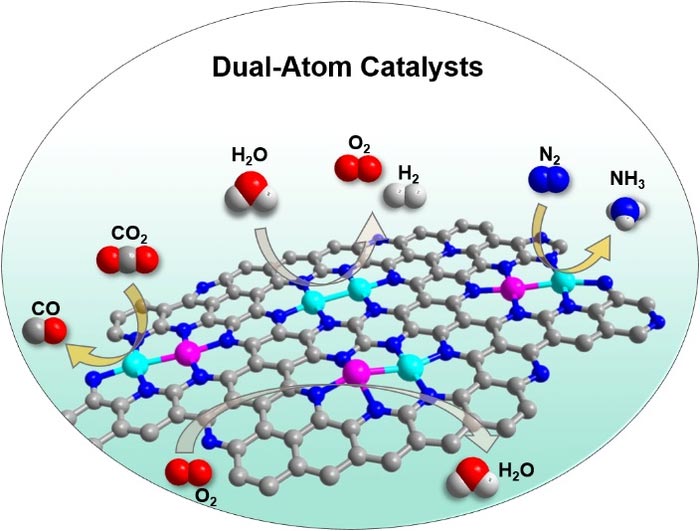Dual-atom catalysts: Controllable synthesis and electrocatalytic applications

Dual-atom catalysts: controllable synthesis and electrocatalytic applications
Credit: ©Science China Press
Over the past decade, single-atom catalysts (SACs) have been intensively investigated in the field of heterogeneous catalysis. However, SACs only contain one metal center, which makes it difficult to break the scaling relationship in many catalytic processes. In recent years, it has been proposed to construct “dual-atom catalysts”, which can overcome the limitations of SACs by introducing a second metal site. While DACs are attracting ever-increasing interest, there are still many challenges remaining. A comprehensive overview of the current landscape will deepen our understanding of DACs and help to develop more efficient catalysts in the future.
Very Recently, Dr. Zhiqiang Niu and colleagues from Tsinghua University have reviewed the progress of the synthesis, characterization and electrocatalytic performance of DACs. The authors summarize the current synthetic strategies and compare their viability. They point out that current characterization techniques do not provide unambiguous evidence for dual-metal sites.
In addition to the commonly used advanced electron microscopy and X-ray absorption spectroscopy, other tools such as infrared could be very useful. The excellence of DACs for catalysis is further illustrated in electrocatalytic processes including HER, HOR, OER, and ORR. Emphasis has been put on the different electronic structures and reaction pathways between SACs and DACs. The authors also suggest that DACs may bridge the gap between heterogeneous catalysis and biocatalysis, worth exploring in the future.
See the article: Zhang S, Wu Y, Zhang YX, Niu Z. Dual-atom catalysts: controllable synthesis and electrocatalytic applications. Sci China Chem, 2021, 64, DOI: 10.1007/s11426-021-1106-9.
All latest news from the category: Life Sciences and Chemistry
Articles and reports from the Life Sciences and chemistry area deal with applied and basic research into modern biology, chemistry and human medicine.
Valuable information can be found on a range of life sciences fields including bacteriology, biochemistry, bionics, bioinformatics, biophysics, biotechnology, genetics, geobotany, human biology, marine biology, microbiology, molecular biology, cellular biology, zoology, bioinorganic chemistry, microchemistry and environmental chemistry.
Newest articles

First-of-its-kind study uses remote sensing to monitor plastic debris in rivers and lakes
Remote sensing creates a cost-effective solution to monitoring plastic pollution. A first-of-its-kind study from researchers at the University of Minnesota Twin Cities shows how remote sensing can help monitor and…

Laser-based artificial neuron mimics nerve cell functions at lightning speed
With a processing speed a billion times faster than nature, chip-based laser neuron could help advance AI tasks such as pattern recognition and sequence prediction. Researchers have developed a laser-based…

Optimising the processing of plastic waste
Just one look in the yellow bin reveals a colourful jumble of different types of plastic. However, the purer and more uniform plastic waste is, the easier it is to…



